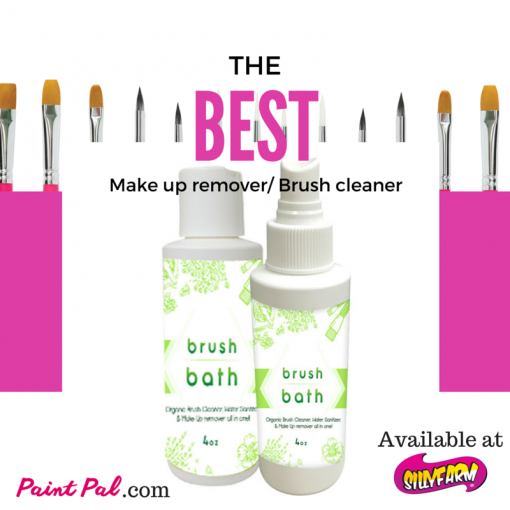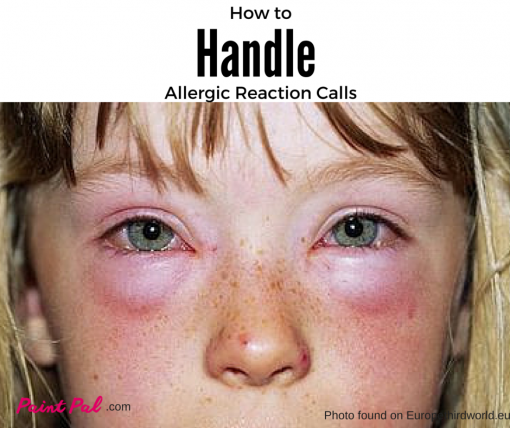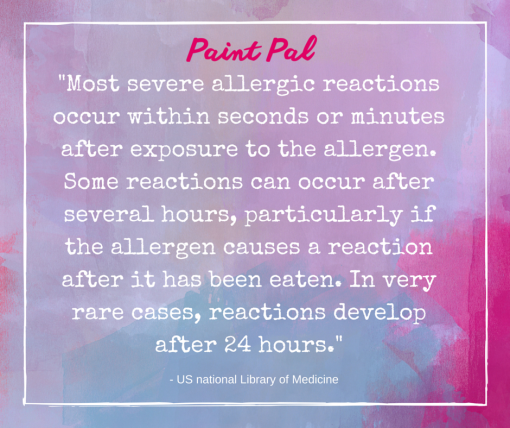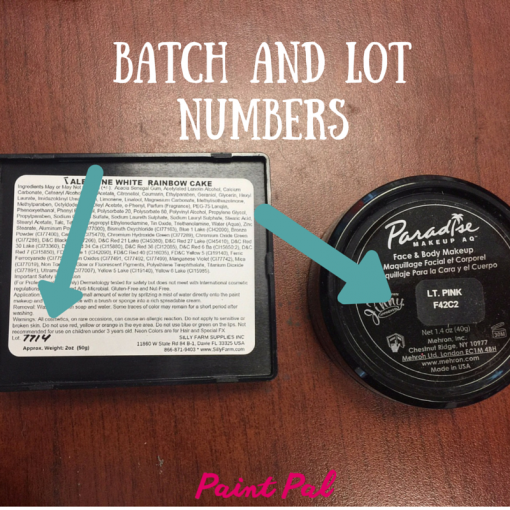By Silly Heather Your Paint Pal
The allergic reaction call is a face painters most dreaded call. Our first instinct is to panic, because no one likes an upset client or the thought of a hurting child. Its hard in the moment to find the right words to calm the parent and save your name from bad publicity. So I decided to write this blog to help you handle that call, should it ever happen and how to keep yourself in the know.
Why would face paint cause an allergic reaction?
I have been eating bananas for 32 years of my life. Last week I woke up, ate a banana and my mouth started tingling. I have never had an allergic reaction so I wasn’t sure what was happening. I took some benadryl and the reaction subsided within 30 minutes.
Allergic reactions are VERY common, and according to studies done by the National Dermatological society it is estimated that 10% of the population will have some sort of allergic reaction from topical cosmetics at some point in their life.
The amount of face painting related reactions are actually very small. On average we receive less than 5 calls a year from parents and painters about reactions. Each of the brands we sell manufacturer their make up in accordance with FDA and EU published cosmetic guidelines and ingredients. But even with testing, strictly using cosmetic pigments and painters practicing good hygiene there is ALWAYS a possibility of an allergic reaction.
Typically the number one cause of an allergic reaction is fragrance and second is when face paint reacts with removers or lotions.
Most people with skin sensitivities are most sensitive to fragrance. Once a product is applied topically to the skin and the fragrance begins to irritate the eye area, especially in kids. They tend to rub their eyes and spread the irritation. One way to avoid this type of reaction, is to speak to the customer before applying make up. When a child sits in my chair and the have visible eczema or sensitive skin, I ask them if they prefer to be painted on the arms or not near the eyes. I ask them if they have sensitive skin so I can avoid getting close to the eyes. Some skin sensitivities aren’t always as visible, so if irritation occurs while you are painting make sure to remove the make up right away with a wet paper towel and a remover like Brush Bath to avoid burning or spreading the irritation. In the worst case scenario, if irritation increases recommend Benadryl to the parent.
The second most common reaction to face paint is how it is applied and removed. My only personal experience with an on site reaction was when I mixed face paint with a thick layer of sunscreen. I live in a very hot area and its common for parents to bring their children to be painted with loads of sunscreen on. However, the mixture of face paint and sunscreen can be a recipe for disaster. The thick nature of sunscreen along with creamy face paint can cause itchiness and clog the pores. Also, when face paint reacts with sunscreen it can be unfavorable to young sensitive skin. So if a child comes to you with a lot of sunscreen on gently clean their face with a wet paper towel a little Brush Bath. The reason I recommend Brush bath is because its an organic make up remover and very very gentle on the skin, it will also remove oils from the skin. Allowing a clean canvas free from heavy cream and open pores.
Typically “most severe allergic reactions occur within seconds or minutes after exposure to the allergen. Some reactions can occur after several hours, particularly if the allergen causes a reaction after it has been eaten. In very rare cases, reactions develop after 24 hours.” So if you receive a call from a frantic parent and the reaction shows up latent, or after removal then more than likely the reaction was caused by removal.
And this is where I can offer my best advice how to explain that to them without shifting the blame or making them feel uncomfortable. Many times problems can be avoided by talking to your customers and informing them about removal tips. I always tell the parents upon exiting my chair, to remove the face paint with baby shampoo and warm water. If any paint residue stays on the skin give it a few minutes and it will fade once the pores exfoliate. Face paint is temporary ( as long as you are using the good stuff ).If the parents head home and scrub their kids skin with harsh removers like alcohol mineral oil close to the eyes they will surely cause some sort of irritation. Many parents only experience with face paint is with the creamy junky stuff from party stores and they typically remove them with oil removers or LOTS of soap and it caused their kids to be upset. So, when they head home to remove a full face tiger and start scrubbing their children chances are they doing more harm than good.
Other reactions are highly unlikely unless the child or customer has severe sensitivities. 90% of our brands are Gluten free, and contain no nut by products. So, nut allergies are not very common in the face paint world.
So how do you handle the call/ complaint about Allergic reactions?
One afternoon I received a call from a frantic face painter about a call from a very upset parent. She claimed all the children broke out in rashes from the paint. I first told her to check the batch number on the paint so I could check about possible recalls or other complaints from that batch. The painter THEN informed me she was grateful was helping her considering she did not buy the paint from me (LOL)
So the first thing you want to say and do when you receive the call
Parents are usually panicked when anything happens to their kid so the 1st thing you want to do is calm the parent by reassuring them their child’s safety is the MOST important thing to you. Start off by saying ” I am truly sorry to hear about the reaction. I will make it a top priority to find out about possible causes of the reaction. Please express my care and love to the kids and their parents affected.” Most people only want 2 things from you. 1) How you will increase their pleasure 2) decrease their pain. So when you begin with addressing their needs and a mission to increase their pleasure you can direct the conversation from their.The second thing you want to say is ” If you dont mind me asking, when did the irritation occur and how was the paint removed” If a parent says they slept in the paint and woke up feeling irritated 
or if they say, I washed their face with my make up remover and it started burning, then you say this in your most concerned and NOT condescending voice “typically an allergic reaction to face paint begins immediately. It may have been a reaction from removing the make up or the kids keeping it on long and rubbing it around their eyes. To my knowledge according to our painting community ( never admit you have had other reactions yourself unless you want to freak them out more) once the paint is removed and if their is slight irritation warm water on the skin or some benadryl helps significantly.”
Once you have offered your concern, possible reasons for the reaction, then you can start explaining reasons for her to feel at ease.
Remind the client that the products you use are cosmetic grade face and body make up. The FDA does NOT approve face paint, they only approve pigments so you can explain that your make up contains FDA pigments and that unfortunately, regardless of safety ratings the likelihood of a reaction is always possible. Then assure the parents you will do your due diligence and contact the manufacturers about possible recalls or other reported reactions and call them back.
Your next step would be to check your supplies. All of your paints should have a lot or batch number on them. Contact the manufacturer and ask about any potential recalls or complaints. They will typically ask for the batch or lot number. if they say none have been reported move on to your other materials. Sadly, I have witnessed some DISGUSTING kits. Filled with cat hair, dirty sponges, dirty water, and its not a surprise there was some sort of reaction. So, if this is you. Its time to start adopting better practices. Use clean sponges, dump your paint water frequently, avoid painting on broken skin, clean your brushes with Brush Bath spray in between kids and take care of your supplies.
 I had one customer call and say the kids experienced stinging from the make up. I went down the list with her of possible causes. She then told me she uses bleach in her water and to clean her sponges. BINGO! The scent and residual bleach was burning the kids and probably ruining her paint. So, before you can conclusively determine why a reaction happened its good to stop and look at the big picture.
I had one customer call and say the kids experienced stinging from the make up. I went down the list with her of possible causes. She then told me she uses bleach in her water and to clean her sponges. BINGO! The scent and residual bleach was burning the kids and probably ruining her paint. So, before you can conclusively determine why a reaction happened its good to stop and look at the big picture.
Avoid using bleach and alcohol on kids, its strong on their skin and its pointless when there are better more effective products on the market. (Like Brush Bath)
The follow up:
The follow up shows respect, concern and accountability. I know it can be uncomfortable but its important for integrity. When you follow up, start by showing your initiative. Explain that you contacted the manufacturer, you double checked your supplies and wanted to make sure that the child was feeling better. Your call back may not solve the problem entirely but you will show good faith and professionalism
If the parent is an ass and wants to be difficult and insists that you pay medical expenses you might have to seek a lawyer. Typically allergic reaction cases are not worth taking to court and most attorneys will advise its not a case worth fighting over. But truly upset parents might consider small claims court in the WORST case scenario. I have been painting for over 15 years and I have never had any cases that extreme. So that’s great news! You can also consult with your entertainers insurance policy about coverage for reactions.
I hope this blog helped to prepare you, should you ever have to deal with allergic reaction call. All of the advice, is personal. If you want 100% professional advice I suggest you consult with an attorney and your insurance policy. Reactions are common, and unavoidable. In the event that you receive an angry call remember to stop, take a deep breath and try being proactive instead of reactive. You can drive the energy and direction of the dilemma with your attitude.
Happy Painting friends and don’t forget to check me out on FaceBook, Instagram and twitter.
and check my schedule for upcoming classes, workshops and travel dates 
Love,
Your Paint Pal
Heather




